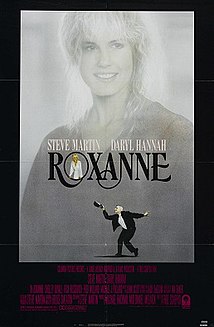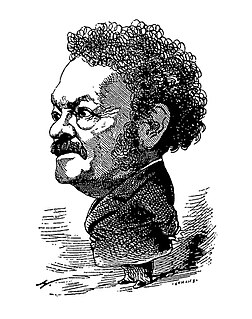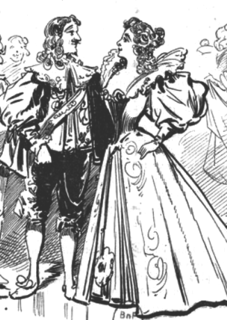Related Research Articles
Thaïs is an opera, a comédie lyrique in three acts and seven tableaux, by Jules Massenet to a French libretto by Louis Gallet, based on the novel Thaïs by Anatole France. It was first performed at the Opéra Garnier in Paris on 16 March 1894, starring the American soprano Sibyl Sanderson, for whom Massenet had written the title role. The original production was directed by Alexandre Lapissida, with costumes designed by Charles Bianchini and sets by Marcel Jambon and Eugène Carpezat. The opera was later revised by the composer and was premiered at the same opera house on 13 April 1898.

Roxanne is a 1987 American romantic comedy film directed by Fred Schepisi and starring Steve Martin and Daryl Hannah. It is a modern retelling of Edmond Rostand's 1897 verse play Cyrano de Bergerac, adapted by Steve Martin. Rostand is mentioned in the opening credits.

The Truth About Cats & Dogs is a 1996 American romantic comedy film directed by Michael Lehmann, starring Janeane Garofalo, Uma Thurman, Ben Chaplin and Jamie Foxx, and written by Audrey Wells. The original music score was composed by Howard Shore. The film is a romantic comedy where two women date the same man, disrupting their friendship.

Cyrano de Bergerac is a play written in 1897 by Edmond Rostand. There was a real Cyrano de Bergerac, and the play is a fictionalisation following the broad outlines of his life.

Cyrano de Bergerac is a 1990 French comedy-drama film directed by Jean-Paul Rappeneau and based on the 1897 play of the same name by Edmond Rostand, adapted by Jean-Claude Carrière and Rappeneau. It stars Gérard Depardieu, Anne Brochet and Vincent Pérez. The film was a co-production between companies in France and Hungary.
Panache is a word of French origin that carries the connotation of flamboyant manner and reckless courage.

Zacharie Jacob, known as Montfleury, was a famed French actor and playwright of the 17th century.

Cyrano de Bergerac is a 1950 American adventure film based on the 1897 French Alexandrin verse drama Cyrano de Bergerac by Edmond Rostand. It uses poet Brian Hooker's 1923 English blank verse translation as the basis for its screenplay. The film was the first motion picture version in English of Rostand's play, though there were several earlier adaptations in different languages.

Fausta is a melodramma, or opera seria, in two acts by Gaetano Donizetti. The Italian libretto was partly written by Domenico Gilardoni, who died while doing so: the remainder was written by Donizetti. The literary source of the opera's libretto is Crispo, a tragedy improvised by Tommaso Sgricci on 3 November 1827.

Antoine III Agénor de Gramont, Duke of Gramont,comte de Guiche,comte de Gramont,comte de Louvigny,Souverain de Bidache was a French military commander and diplomat. He served as Marshal of France from 1641, Viceroy of Navarre and Béarn, and Governor of Bayonne.

Les Paladins is an opera by Jean-Philippe Rameau first performed on 12 February 1760 at the Paris Opera. The author of the libretto is not known for sure but was probably one of the Duplat de Monticourt brothers. Rameau called Les Paladins a comédie lyrique, putting it in the same category as his earlier work Platée.

Cyrano: The Musical is a musical with music by Ad van Dijk, an original book and lyrics by Koen van Dijk. For the Broadway production, English lyrics were provided by Peter Reeves, with additional lyrics by Sheldon Harnick.

Partenope is an opera by George Frideric Handel, first performed at the King's Theatre in London on 24 February 1730. Although following the structure and forms of opera seria, the work is humorous in character and light-textured in music, with a plot involving romantic complications and gender confusion. A success with audiences at the time of its original production and then unperformed for many years, Partenope is now often seen on the world's opera stages.

Les martyrs is a four-act grand opera by Gaetano Donizetti set to a French libretto by Eugène Scribe. The libretto was based on one written by Salvadore Cammarano for an original Italian version known as Poliuto, which was not performed until after the composer's death. Pierre Corneille's play Polyeucte written in 1641–42, the story of which reflected the life of the early Christian martyr Saint Polyeuctus, is the original source for both versions.
Cyrano de Bergerac: The Musical is a musical with a book and lyrics by Leslie Bricusse and music by Frank Wildhorn. It is based on the play of the same title by Edmond Rostand.
Calvin Berger is a musical with book, lyrics, and music written by Barry Wyner. Its story is loosely based on Rostand's Cyrano de Bergerac.

Cyrano is an opera in four acts composed by Walter Damrosch to an English language libretto by William James Henderson based on Edmond Rostand's play, Cyrano de Bergerac. It premiered at the Metropolitan Opera in New York City on February 27, 1913, with Pasquale Amato in the title role and Frances Alda as Roxane.
Cyrano de Bergerac is a 1946 French romantic comedy film directed by Fernand Rivers and starring Claude Dauphin, Ellen Bernsen and Pierre Bertin. It is based on the 1897 play Cyrano de Bergerac by Edmond Rostand.

Hercule mourant is an opera by the French composer Antoine Dauvergne, first performed at the Académie Royale de Musique on 3 April 1761. It takes the form of a tragédie lyrique in five acts. The libretto, by Jean-François Marmontel, is based on the tragedies The Women of Trachis by Sophocles and Hercule mourant, ou La Déjanire (1634) by Jean Rotrou.

Ninette is an opéra comique in three acts, with music by Charles Lecocq and words by Charles Clairville Jr, Eugène Hubert, G. Lebeaut and Ch. de Trogoff. It was first performed at the Théâtre des Bouffes-Parisiens, Paris, on 28 February 1896.
References
- ↑ "Cyrano, Florida Grand Opera" by Robert Carreras, Opera Today, 22 April 2011